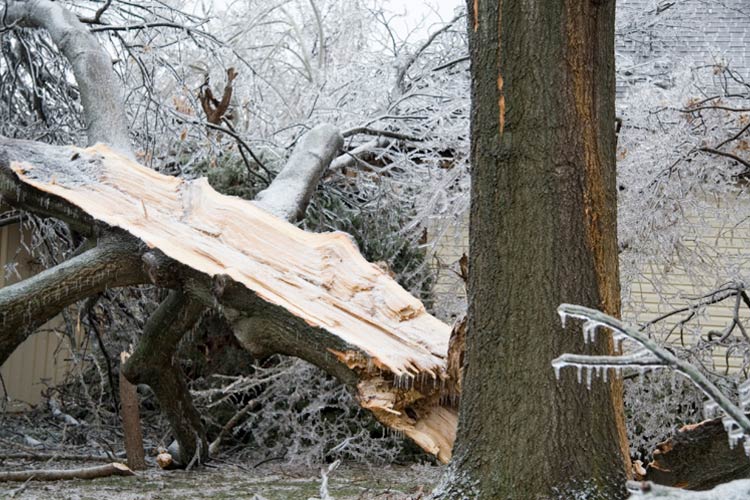
Trees can provide tons of beneficial shade for homeowners, but they can also pose great danger to your property it they’re not maintained. The last thing you want is to have a tree fall on your home and cause damage. But what if your neighbor’s tree falls onto your home? Who’s responsible for this mess, anyway?
Fortunately, an Illinois independent insurance agent can help you answer this question, and help you find the right homeowners insurance. With their help, you’ll be protected against falling trees and much more. But to start off, here’s a breakdown of who’d be responsible in this specific scenario.
How Do You Know Whose Tree It Is?
Before any insurance claims get filed, it’s important to know who the tree legally belongs to. It’s easy enough to figure out, fortunately. The land that the tree’s trunk sits on determines the owner of the plant. It doesn’t matter if the branches hang over a neighbor’s house.
If you walk outside one day to find a fallen branch on your lawn (or worse, your roof), but see the trunk still proudly sitting on your neighbor’s yard, you can be sure that it was their tree. Be sure to maintain all the trees on your property to prevent potential incidents before they happen.
Who’s Responsible for Fallen Tree Damage in This Case?
It really depends on why the tree fell in the first place. If the tree fell due to your neighbor’s negligence, such as if they failed to remove it even though it was rotted or dead, it would be their responsibility. But insurance expert Paul Martin notes that some trees fall due to “acts of God,” like storms, wind, etc., and are no one’s responsibility.
Will My Homeowners Insurance Cover Me if I’m Found Responsible?
The only way you’d be found responsible in this specific incident is if you did something directly to cause your neighbor’s tree to fall. If you negligently drove onto your neighbor’s lawn and struck the base of the tree, for example, that would be on you.
If for some reason you were found guilty for a neighbor’s fallen tree, your Illinois homeowners insurance would still kick in to protect you. If they pressed charges against you for damaging their tree or yard, your homeowners insurance could cover the associated costs.
How Much Does a Fallen Tree Claim Cost in Illinois?
The amount of property damage caused by the fallen tree and a few other factors determine the cost of a related claim. Your Illinois homeowners insurance likely comes with limits of $500 or $1,000 for the removal of fallen trees. Depending on the size of the tree, that might not be enough coverage.
It’s estimated that some fallen trees can cost upwards of $2,000 or even more to be cleared and hauled away. Any added property damage to your home would obviously increase this loss even further. An Illinois independent insurance agent can help you review this section of your homeowners insurance to be sure of how much coverage you have.
Is Damaged Landscaping Also Covered by Illinois Homeowners Insurance?
Depending on the specific circumstances, damaged landscaping should also be covered by your Illinois homeowners insurance. If your neighbor’s fallen tree smashed your garden, you might be able to get reimbursed for those costs through your insurance.
Your own negligence towards your landscaping is not covered, though. So if you just fail to maintain your lawn and landscaping, your homeowners insurance policy won’t cover that. An Illinois independent insurance agent can explain further.
How to Start Preventing Fallen Trees Today
It’s best to eliminate the risk of fallen trees before they ever come down. Fortunately, by following just a few action steps, you can greatly increase the likelihood that you’ll never find your property, or your neighbor’s property, smashed by a fallen tree.
- Regularly check your tree’s health: It’s important to always be on the lookout for rotting, decaying, dead, or diseased trees on your property. Check your plants’ roots, branches, leaves, trunks, etc. for signs of decay regularly.
- Take care of pests and fungi quickly: It’s also critical to keep an eye on your trees for signs of insect infestations or fungi, as these can easily kill the plant. If you spot a problem, get it taken care of ASAP.
- Clear out dead foliage: Sometimes, sadly, there’s no saving your tree. If you know one is beyond the point of recovery, it’s important to get it removed before it can cause any major damage.
Start taking these action steps today to ensure a safe living space for yourself and your neighbors. Also, don't be afraid to tell your neighbor if you spot a tree on their property that looks like it might be problematic down the line. You could prevent a ton of trouble for both of you in doing so.
Here’s How an Illinois Independent Insurance Agent Can Help
Independent insurance agents are fully equipped to protect homeowners against commonly faced liabilities. Illinois independent insurance agents shop multiple carriers to find providers who specialize in homeowners insurance.
They can deliver quotes from a number of different sources and help you walk through them all to find the best blend of coverage and cost.
https://www.iii.org/article/homeowners-insurance-basics
https://www.iii.org/article/if-a-tree-falls-on-your-house-are-you-covered
© 2024, Consumer Agent Portal, LLC. All rights reserved.